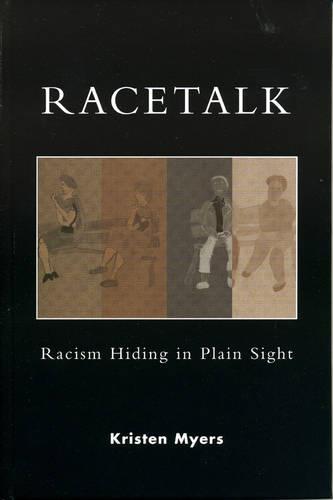Overview
Studying racism is challenging. Most people avoid publicly expressing racialized comments in fear of being labeled racist. Much public talk is sugar coated and coded to distance the speaker from the racist message. This study captures behind the scenes commentary—racetalk—that degrades people due to race and ethnicity. Despite racial inroads made over the past several decades, the racetalk in this study evinces old fashioned racist ideas persisting in modern imaginations. These scripts say that African Americans are dangerous. Whites are superior. Latinos are dirty and disposable. Indians are sinister. Slavery is a trivial—if not nostalgic and amusing—historical anomaly that is better forgotten. Private racetalk keeps these old scripts hidden yet alive. Through racetalk, people imbue different racial and ethnic groups with oppositional statuses. Racetalk delineates boundaries between whiteness, blackness, and brownness. Racetalk is a tool used in policing these boundaries. Most people who cross racial/ethnic boundaries through alliances, friendships, and courtships are sanctioned. Nevertheless some people are able to cross more successfully than others. An analysis of the content of racetalk reveals the processes through which people negotiate racial/ethnic meanings and boundaries on a daily basis. In so doing, they often perpetuate the old racial regime but occasionally they challenge it.
Full Product Details
Author: Kristen A. Myers
Publisher: Bloomsbury Publishing Plc
Imprint: Rowman & Littlefield Publishers
Dimensions:
Width: 14.90cm
, Height: 2.40cm
, Length: 23.60cm
Weight: 0.517kg
ISBN: 9780742535336
ISBN 10: 0742535339
Pages: 312
Publication Date: 11 August 2005
Audience:
General/trade
,
General
Format: Hardback
Publisher's Status: Out of Print
Availability: Awaiting stock

Reviews
Through challenging the structures of talk and discourse in daily US life, Myers hopes that the structures of racism and domination will likewise be challenged and ultimately changed. * CHOICE * By focusing on how people invoke race and racism in their mundane conversations, Myers demonstrates how discrimination is still an integral aspect of U.S. society. Recommended. * CHOICE * This exciting new work focuses on individual—not institutional—forms of racism, requiring us to rethink the idea that prejudice is no longer fundamental to an understanding of racial dynamics in this country. Myers has obtained amazing data through discussions with college students, making Racetalk a significant contribution to the current literature on racism. -- Benjamin Baez, Georgia State University
This exciting new work focuses on individual--not institutional--forms of racism, requiring us to rethink the idea that prejudice is no longer fundamental to an understanding of racial dynamics in this country. Myers has obtained amazing data through discussions with college students, making Racetalk a significant contribution to the current literature on racism.--Benjamin Baez
Through challenging the structures of talk and discourse in daily US life, Myers hopes that the structures of racism and domination will likewise be challenged and ultimately changed. CHOICE By focusing on how people invoke race and racism in their mundane conversations, Myers demonstrates how discrimination is still an integral aspect of U.S. society. Recommended. CHOICE This exciting new work focuses on individual-not institutional-forms of racism, requiring us to rethink the idea that prejudice is no longer fundamental to an understanding of racial dynamics in this country. Myers has obtained amazing data through discussions with college students, making Racetalk a significant contribution to the current literature on racism. -- Benjamin Baez, Georgia State University
Through challenging the structures of talk and discourse in daily US life, Myers hopes that the structures of racism and domination will likewise be challenged and ultimately changed. * CHOICE * By focusing on how people invoke race and racism in their mundane conversations, Myers demonstrates how discrimination is still an integral aspect of U.S. society. Recommended. * CHOICE * This exciting new work focuses on individual-not institutional-forms of racism, requiring us to rethink the idea that prejudice is no longer fundamental to an understanding of racial dynamics in this country. Myers has obtained amazing data through discussions with college students, making Racetalk a significant contribution to the current literature on racism. -- Benjamin Baez, Georgia State University
Author Information
Kristen A. Myers is associate professor of sociology at Northern Illinois University.




